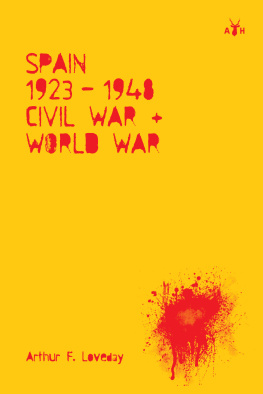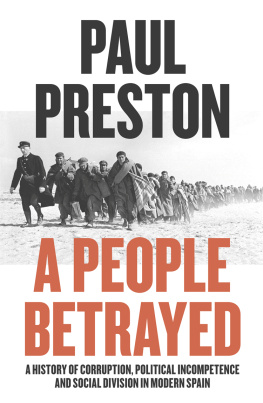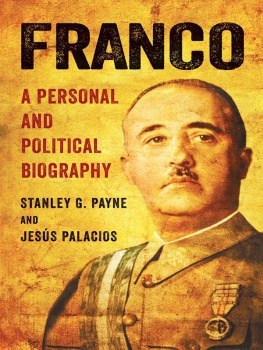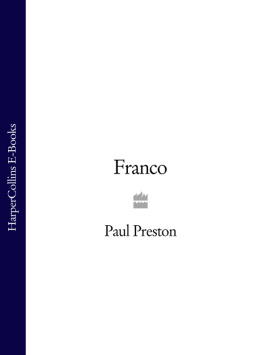The contributions of Spanish scholars to the history of modern Spain has been outstanding and has enriched my own understanding of Spanish history. I would like to acknowledge my own debt to their achievements. Since I have not altered the main text, this acknowledgement can only take the form of an expanded bibliography. A comparison with the original bibliography highlights the progress that has been made, particularly in the field of economic history.
In this edition I have added chapters that bring the story up to the death of General Franco. They owe much to the collaboration of Professor J.P. Fusi contained in our Espaa: De la dictadura a la democrcia ( Editorial Planeta, Barcelona, 1979).
The bibliographical references in these new chapters are not incorporated in the bibliographical index, but full details are contained in the footnotes.
R. C.
PREFACE TO THE FIRST EDITION
IN venturing into what is, in terms of modern historical scholarship, largely an unmapped region, the author is very conscious both of his great debt to those few great scholars who have depicted some features of the landscape and of the immensity of the unexplored. The economy of Spanish historiography of the modern period is in an acute state of imbalance which is, no doubt, reflected in this book. Thus, if the author has exaggerated the role of Catalonia, this is partly because Catalan historians have examined their past with greater care than the historians of some other regions. Much fundamental work remains to be done and ignorance has sometimes encouraged a surrogate for scholarship--large-scale generalizations on the nature of Spain and Spanishness. More would be achieved by patient investigation of those features of Spain's political and economic underdevelopment which she shares with other societies. Thus there was nothing unique, for example, in the gap between improvers' schemes and farming practices in the later eighteenth century. What was unusual was the relative failure of the land in the nineteenth century outside the productive periphery. Yet even this regional contrast of prosperity and stagnation, which provides a key to the modern history of Spain, is a characteristic shared by other developing countries.
Any historian who endeavours to write on a long period of time must be aware of imperfections and inequalities of treatment, of departures from an ideal balance. No doubt many will find the general proportions eccentric and ill conceived; these inevitably depend on the author's own knowledge and interests however much he may have strived to treat what is important in its own right.
An attempt has been made to combine social history and political history--often at the cost of coherent narrative and to the almost complete exclusion of foreign affairs. The heart of the book is in the middle and it is weak at both extremities where the reader will find less evidence of what is often called original research. As it approaches modern times, politics are treated in greater detail and have tended to oust the description of society;
-vii-
this in part derives from the peculiar nature of the sources, in part from the conjecture that the fundamental failure was a political failure. Some day I hope that I may be able to construct a more rounded picture of this later period, full of problems as it is.
To ease the understanding of the narrative a chronological table has been added. The bibliography is highly selective and the true bibliography is in the footnotes, since much is mined from sources which the author of a general history might have hoped to find exploited by his predecessors. Where it is appropriate brief biographical details are included in the index.
The Spanish edition of this work contains certain additions, many of them for the period after 1898. For much of this supplementary material I am indebted to Joaquin Romero Maura.
I must express gratitude not only to those Spanish scholars who have guided me (in particular to the late Jaime Vicens Vives from whose investigations much of the statistical appendices are derived) but for the help unstintingly given by Dr. Alistair Hennessy, Dr. Eric Christiansen, Dr. J. M. Houston, Mr. Burnett Bolloten, Seor Juan Martnez Alier, Mr. Richard Robinson, Mr. Hugh Thomas, and Mr. Malcolm Deas. Both the Master of St. Catherine's College and Mr. F. W. D. Deakin have given me invaluable editorial counsel, and Professor Robin Humphreys read some of the sections on Latin America. Acknowledgement of aid is accompanied by the customary disclaimer of any responsibility, on the part of those who gave it, for faults in the present text.
My deepest debt is to St. Antony's College. For many years, long before it honoured me with a Fellowship, both its Warden and its members supported and encouraged my work. On a long haul such support was a necessity and it was given without the asking.
-viii-
CONTENTS
I. THE ECONOMIC STRUCTURE OF THE ANCIEN
|
|






